Browse
Education
Global South Feminist Scholar Award
This award is conceived to recognise the significant contributions of mid-career to senior scholars in and from the Global South to feminist and gender scholarship in IR broadly defined. Hegemonic Euro- and West-centrism often renders the important work of this category of scholars invisible as study after study from within and without the ISA has shown. Because their subjects, methods, sources, resources, theories and frameworks are evaluated according to standards of scholarship set by the Global North academy, this work is often devalued and invisibilized. At the same time, scholars from the North, feminist or not, draw upon these and other indigenous knowledges, often without acknowledgement, to better situate their own research on those contexts.
Thus, this award addresses the acknowledged tendency for epistemologies of the Global South to be marginalised and unaccounted for both in IR specifically, and global knowledge production in general, and for feminist scholarship to be diminished within the various disciplines. It aims to decentre whiteness, recognise other universes of knowledge, acknowledge the contributions of Global South studies to the global academy, and engender the decolonisation of the field of feminist and gender studies, and of international studies itself.
In doing these, the proposed award enhances the ongoing efforts at inclusion and transformation within the FTGS, complementing existing awards which recognise excellence in feminist research, while at the same time filling a gap in redefining excellence in more global and inclusive terms.
Eligibility
Scholars in the area of feminist theory and gender studies whose scholarship have extended the frontiers of the discipline and advanced our understanding about Global South contexts in particular
Must be from the Global South and based at institutions located there
Must have made significant and demonstrable impact (locally or internationally) on the fields of feminism, gender and international studies, broadly defined, either through scholarship and teaching, mentoring, leadership, policy-relevant work, or any combination of these
Targets mid-career to senior scholars specifically
Nominees need not be members of ISA and FTGS at the time of nomination, but awardees are expected to become members of ISA and FTGS upon conferment of the award
Nominations
The award committee eagerly solicits nominations from all across the globe of individuals who meet the above criteria. Given the structural barriers already identified above, the newly-constituted award committee will also actively reach out to individuals, institutions and networks in the Global South for nominations.
Nominators may submit (a) a nomination letter highlighting the fitness of the nominee for this award (b) nominee’s abridged CV, no more than 5 pages long, and (c) supporting letters (if available) from persons familiar with the nominee’s scholarship and work.
Nomination and supporting letters should not exceed two pages each.
Self-nominations are welcome.
Prize
The recipient will receive a certificate and a cash prize of $800.
How to apply
Submit all documents by email to the chair of the award committee, Olajumoke Yacob-Haliso, yacob-halisoo@babcock.edu.ng. The deadline for nomination this year is October 18, 2021.
About the FTGS
The Feminist Theory and Gender Studies section of the International Studies Association brings together scholars who apply feminist theory to International Relations or look at the field through a gender lens. For more information, visit: https://www.isanet.org/ISA/Sections/FTGS.
By:
Raquel Acosta
Monday, Oct 11, 2021
CULTURE AND SOCIETY
+1
No Preview Available
Leave a comment
Higher Education in Africa: Current status and perspectives for inclusive transformation
African universities are expected to help tackle challenges facing the African society and realise the aspirations of the Africa Agenda 2063 and the UN Agenda for Sustainable Development Goals 2030 in the current context of globalization of higher education. Unfortunately, there have been substantial challenges affecting Higher Education in Africa, notably the disparities in gender inclusion, limiting the potential of women, and the decline in average public expenditure per tertiary education student, making Sub Sahara Africa tertiary education enrollment ratio the lowest in the world.
In this edition, we have published nine papers addressing issues related to higher education in Kenya, Uganda, the Democratic Republic of Congo, Cameroon, Zambia, Mozambique, Ethiopia, and Sudan. In particular, the issue brings insights into the future of the African University, the importance of regional academic training programs, the gender disparities in participation in Science, Technology, and Innovation, and the mechanisms for financing and strengthening higher education in Africa.
By:
Raquel Acosta
Monday, Oct 11, 2021
EDUCATION

Leave a comment
Universities’ key role in the future of global food systems
African academics say that partnerships and collective action across different sectors, including higher education and research, are needed to actualise the resolutions agreed upon at the United Nations Food Systems Summit held on 23 September in New York.“The common message and commitment to global partnership for collective action, and the urgency to address the climate change challenge, as well as other environmental hazards, resonates well with the commitments that emerged from several national and regional dialogues, including those facilitated by RUFORUM,” said Professor Adipala Ekwamu, executive secretary of the Regional Universities Forum for Capacity Building in Agriculture (RUFORUM).The key issue, however, is the implementation of the agreed action points of the eight-month regional dialogues that preceded the summit, he said.For Africa, what is needed are efforts to revamp investments in various agriculture initiatives, and adequately invest in science, technology and innovation and in human capital development to elicit the necessary responses and change.Inclusivity“Africa must also engage more actively in harnessing digital technologies and its renewable energy resources. Above all, we will need to maintain focus on ensuring inclusivity in the different undertakings. Continued academia-science-policy interaction will help us leapfrog forward,” Ekwamu said.The UN event recognised the fact that food systems cannot thrive without all sectors working together as one; hence, the need to involve various sectors of government, and the need for interaction of “multiple scientific disciplines”, as well as traditional and indigenous knowledge.The summit also emphasised the need to scale up public and private financing for food production as well as science and research.According to Kay Muir-Leresche, retired professor of natural resource economics and member of the RUFORUM international advisory panel, the role of universities in the future of food systems “needs much greater emphasis – not as ivory towers but as the spigots that can play a central facilitating role”.She said she was disappointed by what she viewed as a lack of focus on implementation and adequate acknowledgement of the place of science and universities in implementing the resolutions.Fragmentation“I have to say that, in general, I am rather disappointed at the very fragmented response … a wide menu of disparate commitments that do not seem to focus on what is needed to make all these things work … building human capital to use new technologies to apply to solving the problems,” she said.In her view, the outcomes needed to have placed more emphasis on investment in the people and institutions that can help to achieve change, by building the capacity for science and the generation of knowledge, as well as in sharing it.“At the moment, it is just many promises to carry out particular things by many actors – not a concerted attempt to address the core problems,” she said, adding that the creation of knowledge by using new approaches that can reach all levels and involve all stakeholders was critical.Equally important was to build the capacity required to use knowledge generated by universities and research institutions for the agriculture sector. The “creation and sharing of knowledge [should be] integrated with building capacity”, she suggested.OperationalisationAccording to Dr Florence Nakayiwa, RUFORUM deputy executive secretary for planning, resource mobilisation and management, commitments made during the summit deserved appreciation and support. What was now required, however, were mechanisms to operationalise them.“We believe the summit process that garnered views from different stakeholders will hold countries and institutions accountable for the promises they made. We want to see a system where there is interface and coherence across the sectors in meeting the post-summit actions,” she said.She said local context was key to the success of the pledges, and decisions made at implementation stage needed to be evidence-based and recognise existing realities.“We should invest in and use the human capital that we have on the continent for sustainable initiatives,” she said.
By:
Raquel Acosta
Monday, Oct 11, 2021
EDUCATION
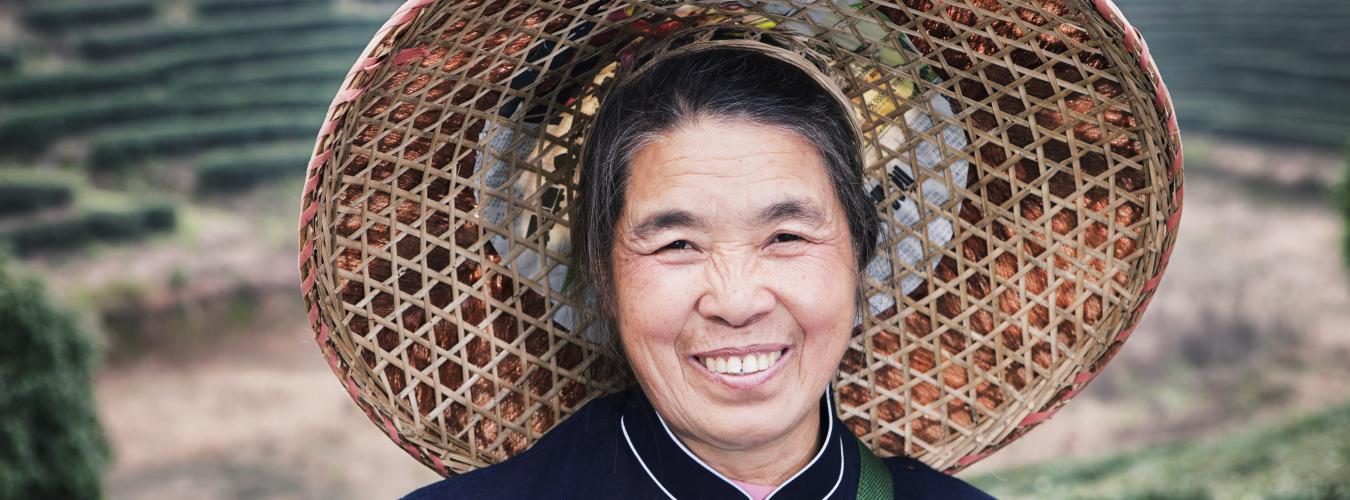
No Preview Available
Leave a comment
The Seventh African Higher Education Week & RUFORUM Triennial Conference 2021
The Seventh Africa Higher Education and RUFORUM Triennial Conference is set under the theme “Operationalising Higher Education for Innovation, Industrialisation, Inclusion and Sustainable Economic Development in Africa: A call for action” that responds to the urgent needs for the African governments, development partners, private sector and citizenry to take actions to invest in higher education. This Triennial conference is convened with the following objectives:
Catalyse investment in Higher Education for human capital development in Africa
Promote international linkages and partnerships for excellence in Higher Education
Strengthen collaboration and mutual learning to spur innovation and industrialisation for economic transformation in Africa
Promote youth employment and skills acquisition for development
Strengthen University-Private sector business linkages
The First RUFORUM Triennial Conference, the 16th Annual General Meeting and 7th African Higher Education Week will be held in the Republic of Benin at Centre International de Conférences et Palais des Congres de Cotonou, Benin from 6th-10th December 2021. The five-day conference will bring together policy makers including Ministers and Technical Experts, Higher Education Leaders in Africa, development partners, private sector leaders, researchers, innovators, students, and farmer organisations, among others. Approximately 1000 delegates are expected from across the world.
By:
Raquel Acosta
Monday, Oct 11, 2021
EDUCATION
Leave a comment
Call for Thought Pieces Regarding Race and Ethnicity in Africa and the Diaspora
AAP is issuing a call for thought pieces from anywhere in the world that are short, critical reflections of issues around race and ethnicity in higher education institutions as well as other key stakeholder organizations in Africa and the African Diaspora.
The first deadline for thought piece summary (up to 500 words) is Oct. 30, 2021. Summaries must include title, text, author’s name and affiliation.
For the full call for contributions and submission details, visit the link below.
https://aap.isp.msu.edu/engage/aap-perspectives/
By:
Raquel Acosta
Friday, Oct 1, 2021
CULTURE AND SOCIETY
+1
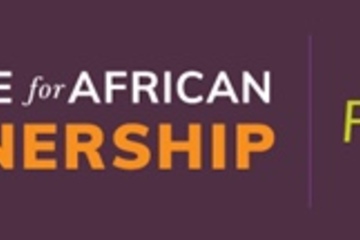
Leave a comment
CFA: Endangered Archives Programme Call for Applications is Open
The Endangered Archives Programme is now accepting preliminary applications for the next annual funding round – the deadline for submission of preliminary applications is Monday 15 November 2021 at 12 noon GMT. Full details of the application procedures and documentation are available on the EAP website (https://eap.bl.uk/applicants).
The Programme has funded over 430 projects in 90 countries and has helped preserve manuscripts, rare printed books, newspapers and periodicals, audio and audio-visual materials, photographs and artwork. The programme aims to digitise archives at risk of loss or decay and, where appropriate, to relocate the material to a safe local archival home. The digital copies are deposited with the local archival partners, and are all available for researchers to access freely through the British Library website.
This year, we are accepting applications through our online portal between 1st and 15th November. However, in the meantime, we are providing Word and PDF documents for applicants to perfect their preliminary applications before the online submission.
If you know of an archive in a region of the world were resources are limited, we really hope you will apply. If you have any questions regarding the conditions of award or the application process, consult our website (https://eap.bl.uk) or contact them at endangeredarchives@bl.uk
By:
Raquel Acosta
Friday, Oct 1, 2021
EDUCATION
No Preview Available
Leave a comment
AAP Public Dialogue Series 2021
AAP is excited to be hosting our next Public Dialogue “The Engaged University: Working with policy makers, the private sector, and communities to advance African higher education transformation” on Wednesday, September 22nd at 9:00am-10:30 EDT. This dialogue session will be co-hosted by our affiliates at @The University of Botswana and those at @SARUA. This session will examine innovative strategies for African universities to engage across all sectors and the impact these engagements are having on the transformation of the African higher education sector. AAP recognizes that universities are now seeing themselves as catalysts for positive change in their communities and beyond, and is proud to be a part of this progress.
This series will be done with the help of @University World News as AAP’s media partner.
By:
Raquel Acosta
Thursday, Sep 16, 2021
EDUCATION
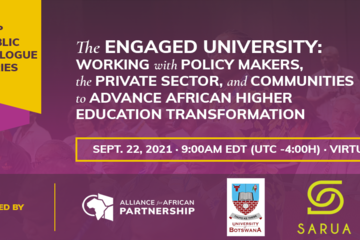
Leave a comment
Connecting with Prof Ayiro and Daystar University
Professor and Vice Chancellor Laban Ayiro from Daystar University, Provost Teresa Woodruff,
ISP Dean Steve Hanson, AAP leadership, and faculty in the College of Communications Arts and Sciences had the opportunity to meet Aug 24. Prof Ayiro met with leadership from the College of Communications and the KEY Team to discuss potential collaborative relationships. AAP is grateful for connecting with Prof Ayiro and Daystar University.
Attached are photos from the event and lunch with Prof. Ayiro capturing Provost Teresa Woodruff, Professor Laban Ayiro, ISP Dean Steve Hanson, AAP Director Jose Jackson-Malete, AAP Director, Amy Jamison, Prof. David Ewoldsen, and Prof. Nancy Rhodes.
By:
Raquel Acosta
Thursday, Sep 9, 2021
EDUCATION
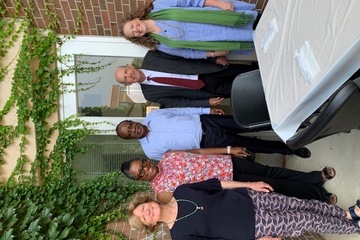
Leave a comment
LECTURE: Coloniality of Higher Education in Africa, the Decolonisation Agenda, and Academic Freedom
You are cordially invited to the Annual NWU Lecture on Academic Freedomby Prof. Kwadwo Appiagyei-Atua, School of Law, University of Ghana,Legon, Accra.Topic: The Coloniality of Higher Education in Africa, theDecolonisation Agenda, and Academic FreedomDate and time: 15 September 2021, 14:00 to 15:30 SAST
If you wish to attend by zoom, please RSVP here:https://urldefense.com/v3/__https://us02web.zoom.us/webinar/register/WN_45iNwZg9THawSADRufGyPA__;!!HXCxUKc!kPN0uvfLvGQ2OI8pyHfemNnhy1vtZVtyWJf3S_H1PlMaNUwFKaopZgNXOtevBAY$ (the event link will be provided to you)
By:
Annemi Conradie
Thursday, Sep 9, 2021
EDUCATION
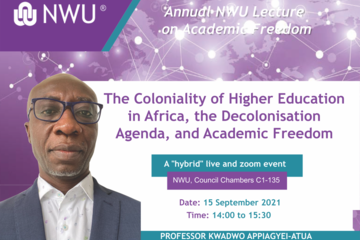
Leave a comment
Souleymane Bachir Diagne in conversation with Wayne Modest, Aude Christel Mgba, and Ryan Skinner.
CONVERSATION | 9 Sept 2021 | 16.00-17.45 CET | Zoom online
As part of the Thinking With series, we invite Souleymane Bachir Diagne to discuss his work in conversation with Aude Christel Mgba and Ryan Skinner. In African Art as Philosophy: Senghor, Bergson and the Idea of Negritude (2011), Souleymane Bachir Diagne writes of Léopold Sédar Senghor’s lifelong project to think through “affirmation of the self [as] a natural reaction to colonial domination” (188): “Beyond affirming the aesthetic virtues revealed in pieces of art created by Africans, Senghor wished to stress the metaphysics they offered for reflection: along with the art through which it had been written, he wished to rescue a worldview, a feeling and a thinking that were also contributions to the humanism of tomorrow by African-being-in-the-world” (7-8).
“In our efforts at the Nationaal Museum van Wereldculturen to better honor and listen to the lives the ‘objects’ in our museums have led and wish to lead, we hope to better think more reciprocally in relationship to these objects and the communities invested in their being. We are compelled by Diagne’s work to think more deeply about the histories, afterlives, and temporalities in which our objects exist. How might we allow the objects to speak better from themselves, for themselves, while all the while honoring the complex positionalities of those who are enjoined to engage these objects? We understand those persons who are called upon to better honor the objects to be: those living in the places where the objects were obtained (gifted, seized, stolen); those who relate to African art from diasporic sensibilities; and those who are implicated by a colonial past as perpetrator and/or who benefit from systems of privilege, as per Michael Rothberg. Together, in Relation, and even thanks to the tensions implied by Glissantian Opacity, we hope to better be responsible to our work and engagement as professionals and visitors to our ethnographic museums.”
More about Zoom event: https://www.materialculture.nl/en/events/thinking-souleymane-bachir-diagne-african-art-phi...
Registration for Zoom event: https://us06web.zoom.us/webinar/register/WN_X6gKuBv3RVuw5FEGTCE6uw
By:
Raquel Acosta
Thursday, Sep 2, 2021
CULTURE AND SOCIETY
+1
No Preview Available
Leave a comment
Call for Abstracts: "Relations to Plants as a Heritage From Below in African Cities"
The deadline for submitting a paper for the panel "Relations to Plants as a Heritage From Below in African Cities" at the next African Studies Association of Africa (ASAA) conference, at the University of Cape Town (South Africa) from 11 to 16 April 2022, has been extended to 30 September. The submission of the paper proposal (max. 250 words) has to be done via this platform: https://2022conference.as-aa.org/submit-work/call-for-abstracts/
ASAA encourages paper presenters to reflect on the conference theme and address issues outlined in the theme description. With a massive number of abstracts submitted for presentations at ASAA conferences, the ASAA2022 Conference Committee is dedicated to guaranteeing a timely and fair review process with the international norms of double-blind peer review.
The decisions of the Scientific Committee will be communicated on 14th November 2021. ASAA early-bird registration will open on 1st November 2021. See eligibility criteria and learn about the application process in the link below!
Call for abstracts – ASAA2022 (as-aa.org)
For any queries with the above, please email: as-aa2022.org@uct.ac.za
By:
Raquel Acosta
Thursday, Sep 2, 2021
CULTURE AND SOCIETY
+1
No Preview Available
Leave a comment
Postgraduate Training Opportunities under the RUFORUM
Graduate Teaching Assistantship Program (GTA)
During the annual meeting of Vice Chancellors/Presidents/Principals/Rectors of RUFORUM Member Universities (see links about RUFORUM flier and RUFORUM at a Glance) held on 11th November 2020, the Vice Chancellors re-affirmed their commitment to the Graduate Teaching Assistantship Program that they initiated in 2014. The objectives of the GTA are to: i) Improve the quality of higher education and increase the pool of PhD-level trained academic staff in African universities; ii) Provide opportunities for the doctoral research to contribute more directly to African development; iii) Strengthen inter- university collaboration in the field of higher education in Africa; and iv) Promote staff mobility among RUFORUM member universities, and across Africa.
Following the meeting of the Vice Chancellors on 11th November 2020, the RUFORUM Secretariat is pleased to announce the availability of training opportunities at the different Member Universities as part of the GTA arrangement. The Secretariat invites for more offers from the other member universities to train GTA candidates.
Under the GTA arrangement:
The sending universities nominate the staff to be trained and RUFORUM Secretariat helps to get them placed in receiving (host) Universities
The sending universities commit to pay for travel, health insurance, upkeep and research of their staff under training
The receiving/host universities waive the fees and associated costs, and provide accommodation for the admitted GTA Fellows
Once admission process is completed, the sending and host universities and the nominated GTA Fellow sign a Tripartite Agreement to guide the hosting and training of the Fellow
In some cases where opportunities exist, the host University may attach the GTA Fellow to the research program at the hosting university
The RUFORUM Secretariat facilitates the GTA arrangement and follows up on the GTA training
The nominations by the Vice Chancellors for the available positions should be submitted to RUFORUM Executive Secretary at secretariat@ruforum.org as soon as possible.
Learn more: https://ruforum.wordpress.com/2021/08/09/postgraduate-training-opportunities-under-the-ruforum-3/?utm_source=RUFORUM+Mailing+List&utm_campaign=d18db56afe-RUFORUM+Weekly+-+Vol.3+No.25_COPY_01&utm_medium=email&utm_term=0_1fcfbb8a0b-d18db56afe-346973753&ct=t()&goal=0_1fcfbb8a0b-d18db56afe-346973753&mc_cid=d18db56afe&mc_eid=d95cf18a8dn
By:
Madeleine Futter
Thursday, Aug 26, 2021
EDUCATION
No Preview Available

Leave a comment